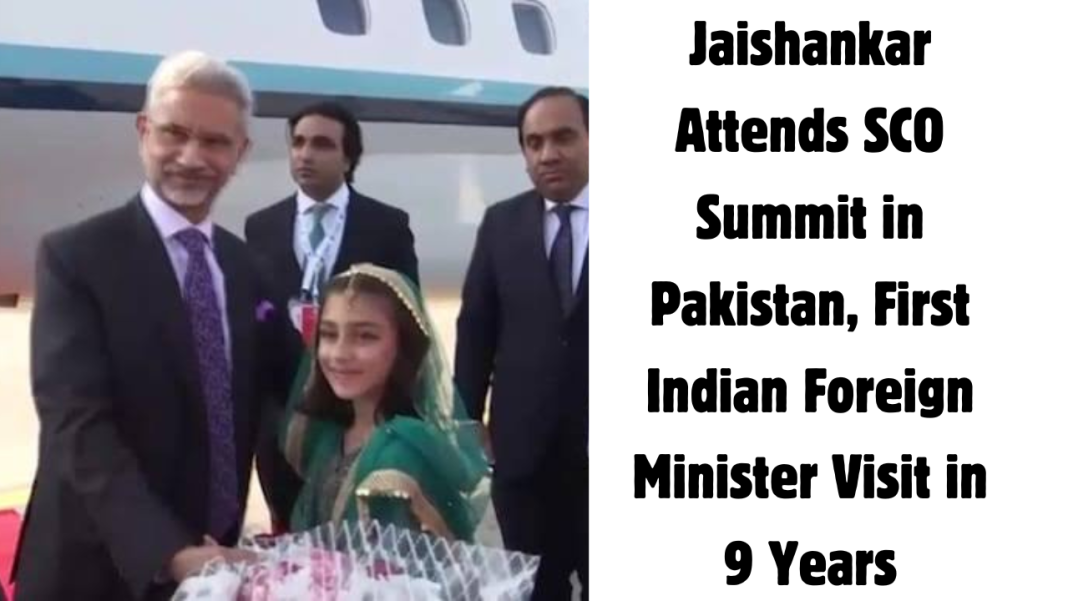Digital News Desk:
Indian External Affairs Minister S. Jaishankar’s arrival in Islamabad on October 15, 2024, marked a historic moment in India-Pakistan relations, as it was the first visit by an Indian foreign minister to Pakistan in nine years. The visit is significant, taking place in the context of the Shanghai Cooperation Organization (SCO) summit, a multilateral platform that includes both India and Pakistan as members.
Diplomatic Context: Nine-Year Hiatus in High-Level Visits
The visit is particularly noteworthy due to the prolonged diplomatic freeze between India and Pakistan, driven primarily by disputes over Kashmir and terrorism. The last high-level visit from India was in December 2015, when then-External Affairs Minister Sushma Swaraj attended a regional conference in Islamabad. Relations have deteriorated further since 2019, following the Pulwama attack and India’s revocation of Article 370, which granted special status to Jammu and Kashmir. Diplomatic exchanges have been sparse, and direct talks have remained off the table.
S.Jaishankar’s visit, though focused on multilateral engagement through the SCO, is still a significant move, considering the backdrop of India-Pakistan relations. However, both sides have made it clear that no bilateral meetings are scheduled during the summit, signaling that while the SCO platform provides a channel for interaction, it does not imply a thaw in the frosty bilateral ties.
The SCO Summit: Focus on Multilateral Cooperation
The SCO summit is focused on regional cooperation in critical areas such as security, counterterrorism, economic connectivity, and regional stability. The organization, which includes major powers like China and Russia, offers a platform for addressing shared concerns, particularly the evolving security landscape in Eurasia. For India, participation in the SCO aligns with its broader foreign policy goals of engaging more deeply with Central Asia and countering China’s influence in the region. India has used the SCO to push its interests in regional security and connectivity, particularly in light of China’s Belt and Road Initiative (BRI), which Pakistan is a central part of through the China-Pakistan Economic Corridor (CPEC).
Pakistan, on the other hand, sees the SCO as an essential avenue to enhance its diplomatic stature. Hosting the summit in Islamabad allows Pakistan to showcase its role in regional diplomacy and connectivity. With its economic challenges and its evolving foreign relations, particularly with its neighbors, the summit offers Pakistan a platform to position itself as a key player in addressing regional issues such as security and trade integration.

India-Pakistan Relations: No Bilateral Talks Expected
Despite Jaishankar’s landmark visit, both India and Pakistan have ruled out bilateral talks during the summit. The Indian Ministry of External Affairs confirmed that Jaishankar’s visit is strictly for the SCO and will not extend to discussions on bilateral issues such as Kashmir or cross-border terrorism. Pakistan’s foreign ministry echoed a similar stance, focusing on the multilateral nature of the engagement.
However, the absence of formal talks does not rule out the possibility of informal interactions. Diplomatic summits often provide opportunities for unofficial conversations between leaders, even if they do not lead to immediate breakthroughs. The summit itself, by its nature, focuses on regional cooperation in areas that require both India and Pakistan to work together, such as counterterrorism, narcotics control, and economic development. In these fields, both nations have a vested interest in maintaining stability, particularly in a region as volatile as South Asia.
Conclusion
S.Jaishankar’s visit to Islamabad for the SCO summit is a landmark event in the context of India-Pakistan relations, marking the first visit by an Indian foreign minister in nearly a decade. While the visit does not signify any thaw in the bilateral relationship, it highlights the importance of multilateral platforms like the SCO in fostering regional cooperation. As both India and Pakistan engage within the SCO framework, their participation reflects a commitment to addressing shared regional challenges, even as their bilateral ties remain frozen.
You May Also Read: Understanding GRAP: A Strategic Framework to Combat Air Pollution in Delhi-NCR








